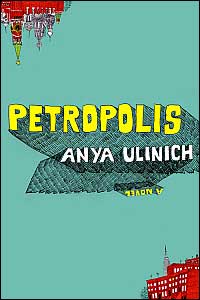
Anya Ulinich’s poignant and bittersweet debut novel, Petropolis, chronicles a teenager’s coming-of-age as seen through the lens of post-Soviet Russia. Motherhood, cultural and personal identity, and survival are woven into a literary narrative that follows misfit 15-year-old Sasha Goldberg from the Siberian outpost of Asbestos 2 to upper middle-class Brooklyn, only to find she will get what she wanted all along — albeit at a price she never realized she would have to pay.
Lubov Alexandrovna Goldberg’s tenacious grip on the intelligentsia goes, for the large part, unnoticed by her daughter. Sasha’s more preoccupied with her missing father, long-gone for America. Lubov, on the other hand, simply removed all traces of him and behaves as if he never existed. The two live quietly, if combatively, in a small Siberian town where the primary economic activity, asbestos mining, has seen more productive days.
Lubov is obsessed with fitting in, while misfit Sasha suffers the abuse heaped on her by other kids because she’s different; she is biracial, Jewish, and overweight. While Lubov dreams of securing a place for her daughter among the Moscow intelligentsia, Sasha, like any other teenage girl, is preoccupied with boys. She is especially enamored of one in particular who comes from a family that Lubov would never approve of.
Sasha’s unexpected pregnancy sets her story on a trajectory to Moscow and beyond. While Lubov hopes to protect her daughter’s future by raising Sasha’s child as her own, motherhood propels Sasha on a quest for the life that would allow her to reunite with her daughter as the child’s mother. One mail-order bride transaction later, Sasha finds herself unhappily engaged to an American man in Arizona. Once there, she decides to find her father, leading her on a cross-country journey that forces her to ultimately define her own identity and make her own future if she is to survive.
Sasha’s child-like, perpetual hope that Asbestos 2 remains the same while she is away, that someday she will be able to return to her hometown and reclaim the child, Nadia, as her own, evolves almost imperceptibly into an adult realization that things can never remain the same, the visual confirmation of which comes with her final visit to Asbestos 2.
Ulinich’s powerful final chapters synthesize the whole of Sasha’s experiences up to that point, allowing Sasha to cross over that invisible line that separates children from adults, with meaningful, thoughtful prose that resonates far beyond the immigrant experience.
As one character tells Sasha, she does not have to split off her childhood memories, as the key is “living in the world, not in a town.” Sasha counters that all Americans are alike: “You think that where you live is the World” (emphasis in original). Sasha notes that her descendants will merely think of themselves as from “Eastern Europe somewhere” rather than know Asbestos 2. By staunchly affirming who she is and where she comes from, Sasha makes firm her place — and her family’s place — in the world. And in the final poignant scenes, Sasha knows that place — that story that began in the far reaches of Siberia — remains immutable, regardless of her future.
With Soviet Russia and its days of homogeny over, in Petropolis, Sasha is emblematic of the new Russia. A direct descendant of a 1957 cross-cultural youth festival, she is culturally and ethnically different from most inhabitants of Asbestos 2, and she is culturally and ethnically different from most Americans she meets.
Curiously, more than any other theme in the book, it is the push and pull of motherhood that most defines Sasha and her relationships across cultures. In Asbestos 2, in Arizona, in Chicago, in Brooklyn, it is motherhood that binds and divides Sasha and the women in her orbit, setting them up as either ally or adversary for Sasha, and sometimes both. It is her child and the hope for a better future for that child that drive Sasha to survive, be it enduring a loveless engagement or the quicksand of misguided charity from an affluent, socially conscious Chicago family, whose actions imprison her more than what they perceive she must have suffered under Soviet rule.
Ulinich’s vivid descriptions make Sasha’s world come alive. Her ability to juxtapose the barrenness of Siberia with the lush landscape of Arizona, and later with Midwestern woods and Brooklyn brownstones, serves to subtly play up the differences and similarities in geography and culture.
With a comic sensibility, Ulinich’s eye for satire and cosmic absurdity illuminates the narrative in a way that elevates it beyond what most readers might expect from a debut novel. While Petropolis is a bit slow in the beginning and slightly awkward in the epistolary sections, where the narrative gets a bit jumpy, Ulinich, who shares some measure of personal experience with Sasha, as both are Russian immigrants to the United States, offers up a well-told, richly layered narrative that goes beyond the usual coming-of-age story.
- Follow us on Twitter: @inthefray
- Comment on stories or like us on Facebook
- Subscribe to our free email newsletter
- Send us your writing, photography, or artwork
- Republish our Creative Commons-licensed content

